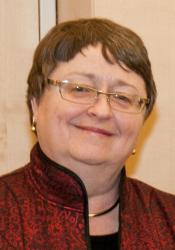Discussion with Kathie Hiers, Chief Executive Officer of AIDS Alabama — April 17, 2013
Kathie was a guest of Clare Housing for the Midwest premiere of deepsouth, a documentary on the HIV epidemic in the South, shown in Minneapolis on April 3. Kathie and her work are featured in the film. She and others describe her as the “Mouth of the South.”
Q: You are a tireless advocate of funding for HIV/AIDS for Alabama and the South. Why are you so often disappointed with the distribution of federal funds?
A: Today only three percent of the federal funds are used for education, prevention, and testing. We need to educate our kids. And we need more funds for affordable housing for those living with HIV/AIDS. Only $330 million of housing funds are set aside for HOPWA – Housing Opportunities for Persons Living with AIDS. With 1.2 million people living with HIV, that $330 million helps just 60,000 of them. A stable house is the biggest factor in health outcomes for those living with HIV/AIDS. Then on top of these deficiencies, rural America receives substantially less federal funding per case than the urban areas.
Q: What makes the South so different from other parts of the country?
A: We have the perfect storm in the South. We are the poorest economically. We have the least access to health care. We have the highest death rate from HIV/AIDS. Only one quarter of the HIV/AIDS doctors are in the South while we have almost half of the people living with HIV/AIDS. The South has the top ten cities for STDs. We are ten to twenty years behind in health care.
Q: What is the future of funding for HIV/AIDS at the national level?
A: We have to figure out how we will access affordable care through the new Affordable Care Act. We have spent 30 years developing Ryan White services. We need to explore how the Ryan White will mesh with the new Affordable Care Act. There are many questions we need to ask ourselves. Will the ACA mainstream HIV? Should we be considering bigger and broader coalitions, such as joining with those working on homelessness? Should we be aligning ourselves with Medicaid? How can we partner with health services and work together for the benefit of those living with HIV/AIDS? We need to find answers to these questions and be a part of the health care discussion. Serving on the Presidential Advisory Council on HIV/AIDS and providing input on the National HIV/AIDS Strategy allows me to be a part of these discussions; however, as the only representative from the South I need support from other Southerners and people who live in rural America. I take my role very seriously, but we need more voices at the big tables.
Q: You say we are in a “polio moment.” What do you mean?
A: At one time polio was a dreaded, viral, infectious disease that crippled thousands of people in the U.S., especially children. Thanks to scientific advances, polio has been defeated in our country. Just last year a major scientific study, HPTN 052, proved that persons living with HIV disease who were successful with their medications and able to maintain a suppressed viral load were 96% less likely to transmit the virus to others. This discovery was exciting on many levels. We can actually see a path to stopping the spread of this epidemic! We may not have a vaccine or a cure for HIV yet, but we can start talking about the end of AIDS. Today about 75% of those living with HIV have detectable viral loads, so we have a lot of work yet to do. We must lower the detectable loads and reduce transmission. In order to accomplish this goal, we also need supportive services and decent, safe, affordable housing. Now is the time to increase resources, not decrease them!
Q: They call you “the mouth of the South.” You are an influential HIV/AIDS advocate. What can individuals do in their communities?
A: State advocacy is extremely important. You have excellent leadership coming from Clare Housing. Get in there and get active in public policy! Educate. Help elected officials and the public understand the role they can play in ending AIDS. Don’t underestimate your power and your story.
Change can happen. We have elected our first openly gay legislator in Alabama. We have young people at our state capitol advocating for comprehensive, sexual health education. I look forward to the day when we can teach the kids in my state what they need to know that reflects today’s science. It will be a happy day when I go out of business at AIDS Alabama.


